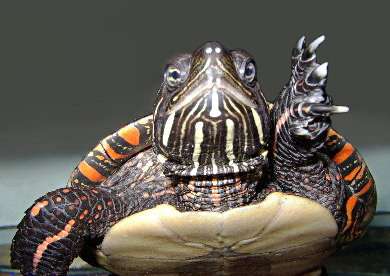May 6, 2013 report
Researchers predict painted turtles face extinction due to global warming

(Phys.org) —A trio of Iowa State University researchers has predicted, in a paper published in The American Naturalist, that the painted turtle (Chrysemys picta) faces extinction over the next century due to global warming. Research conducted by the team suggests that as the planet warms, painted turtles will begin to produce female-only offspring, leading to gradual extinction of the species.
Painted turtles are the most common species of turtle in North America, and thus are not currently listed as endangered. That will change soon, however, predicts the ISU team, because the gender of their offspring is determined by ambient air temperatures while the young are still growing inside their eggs. Team member Fredric Janzen has been studying the nesting habits of painted turtles for over 25 years—he's found that painted turtle nesting, like that of many other reptiles, is impacted by how warm or cold it is outside. Warmer temperatures result in more females being born, while colder temperatures result in more males.
Using data from Janzen's research, the new effort entailed creating mathematical models that could predict the gender of painted turtles before they hatched. The team found a success rate of 40 out of 46. Their models show that an average increase in temperature of just 1.1 °C would be enough to cause the turtles to produce all female clutches. The general consensus among Earth scientists is that average temperatures in North America will increase by approximately 4 °C over the next century, which unless something changes, will spell almost certain extinction for the painted turtle.
Painted turtles are able to adjust the timing of their egg laying, the team notes, by as much as 10 days. If it grows unnaturally warm in the spring, the females will begin laying eggs early. Similarly, if there is a late spring, the turtles can put off laying their eggs a few days in the hopes it will grow warmer. But that won't be enough to prevent all-female clutches in the future, the team says—even if the turtles make simple adaptations, such as laying eggs in the shade—it won't help because it will still be too warm. Painted turtles have long life spans and take a long time to mature and because of that, won't be able to evolve at the pace of global warming, the team says. They will simply run out of time.
More information: Modeling the Effects of Climate Change–Induced Shifts in Reproductive Phenology on Temperature-Dependent Traits, Rory S. Telemeco, Karen C. Abbott, and Fredric J. Janzen, The American Naturalist, Vol. 181, No. 5 (May 2013), pp. 637-648. www.jstor.org/stable/10.1086/670051
Abstract
By altering phenology, organisms have the potential to match life-history events with suitable environmental conditions. Because of this, phenological plasticity has been proposed as a mechanism whereby populations might buffer themselves from climate change. We examine the potential buffering power of advancing one aspect of phenology, nesting date, on sex ratio in painted turtles (Chrysemys picta), a species with temperature-dependent sex determination. We developed a modified constant temperature equivalent model that accounts for the effect of the interaction among climate change, oviposition date, and seasonal thermal pattern on temperature during sexual differentiation and thus on offspring sex ratio. Our results suggest that females will not be able to buffer their progeny from the negative consequences of climate change by adjusting nesting date alone. Not only are offspring sex ratios predicted to become 100% female, but our model suggests that many nests will fail. Because the seasonal thermal trends that we consider are experienced by most temperate species, our result that adjusting spring phenology alone will be insufficient to counter the effects of directional climate change may be broadly applicable.
Journal information: American Naturalist
© 2013 Phys.org
















